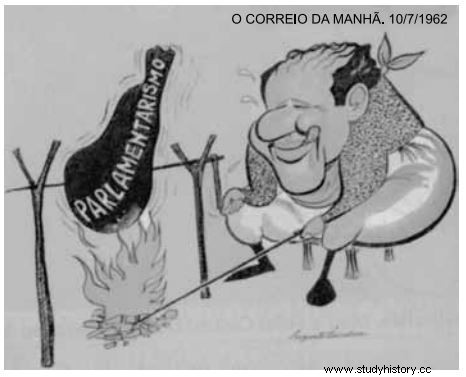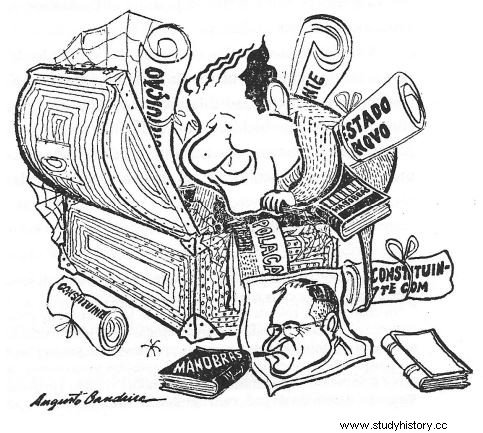b) The immediate call for new elections, an act that did not please the more conservative sectors of the army.
c) The creation of a government of exception, commanded jointly by the presidents of the Chamber and the Senate, until Vice President João Goulart returned to Brazil at the time of his resignation on an official visit to China.
d) The creation of a civil-military cabinet to govern the country until new elections were held, but which ended up precipitating the Military Coup, in 1964, before the elections took place.
e) The granting of broad powers to the Chain of Legality, led by the nationalist sectors and the PTB.
Question 02 - PM-MG - 2015 - João Goulart's government was marked by intense political tension and economic crisis. Jango's political performance, in addition to the populist nature inherited from Getúlio Vargas, was also identified as communist by Brazilian conservative forces. Analyze the statements below and then mark the CORRECT alternative.
I. Jango began to govern with powers restricted by the parliamentary system, adopting a moderate line during this period, seeking to demonstrate his adherence to democratic principles and his repulsion to communism.
II. In the military circles, from 1963 onwards, the conspiracy against Jango grew, strengthened by the partisans of a “defensive intervention” against Jango's excesses.
III. Jango's political stance generated popular revolt against the Grassroots Reforms, which negatively affected the less favored classes.
A. ( ) Only statement I is correct.
B. ( ) All statements are incorrect.
C. ( ) Only statements I and II are correct.
D. ( ) All statements are correct.
Question 03 - CEFET-MG - 2011-2 - External Concomitance Technician - From January 1963, João Goulart governed Brazil under the presidential regime. About this period, it is stated:
I - The Armed Forces played the role of guarantor of the elected government in the form of the Constitution.
II - The agrarian oligarchies and the urban bourgeoisie were Jango's main allies during his government.
III - Social tensions increased at the same time as political forces were radicalized.
IV - Relations with the US deteriorated and Washington's pressure on Goulart became increasingly incisive. Only statements
a) I and II.
b) I and IV.
c) II and III.
d) III and IV.
Question 04 - FGV-SP 2010 - Economy - 1st phase -
 (Augusto Bandeira, O Correio da Manhã, 10.07.1962, apud Jayme Brener, Jornal do Século XX, p . 226)) The cartoon shows President Jango
(Augusto Bandeira, O Correio da Manhã, 10.07.1962, apud Jayme Brener, Jornal do Século XX, p . 226)) The cartoon shows President Jango(A) interested in the reestablishment of presidentialism, since his inauguration, in 1961, was only guaranteed with the institution of parliamentarism.
(B) defending the maintenance of the parliamentary system, the opposite position of Carlos Lacerda (UDN) and Adhemar de Barros (PSP).
(C) blamed for the political radicalization of the government due to the option for the parliamentary system and for agrarian reform.
(D) receiving support from the Peasant Leagues to defend the approval of a constitutional amendment that would establish agrarian reform.
(E) oblivious to the serious political crisis generated by the institutionalization of parliamentarism and worried about the 1965 presidential elections.
Question 05 - Machado de Assis Institute - 2018 - Luís C City Hall orreia - PI - History Teacher -
The government of João Goulart (1961-1964) was the most troubled in the history of the Brazilian Republic. Based on previous knowledge about this government, it is appropriate to state that:
(A) Goulart's government did not continue an independent foreign policy followed by the previous one.
(B) In his government there was no due to various social interests.
(C) João Goulart adopted a reformist national policy, based on the Triennial Economic Development Plan.
(D) Jango encouraged the participation of foreign companies in various sectors and did not concerned about social dissatisfaction.
Question 06 - UERJ 2016.2 - I address myself to all Brazilians, not only to those who managed to acquire education in schools, but also to the millions of our brothers who give Brazil more than they receive, who pay in suffering, in misery, in deprivation, the right to be Brazilian and working sun to sun for the greatness of this country. Here are my working friends, in the presence of the most significant workers' organizations and popular leaderships in this country. To those who demand a word of reassurance from the President of the Republic for the Nation, what I can say is that we will only achieve social peace through social justice. Most Brazilians no longer conform to an imperfect, unfair and inhuman social order. João Goulart, at a rally in Rio de Janeiro, 03/13/1964. Adapted from Jornalggn.com.br.
At the event known as the Central do Brasil Rally, President João Goulart gave a speech in which he reaffirmed some of his government's proposals, meeting the demands of union organizations. The proposal of this government most directly associated with the promotion of social justice was:
(A) carrying out agrarian reform
(B) free public education
(C) granting the vote to the illiterate
/>(D) introduction of labor rights
Question 07 - UPF 2018.1 - On March 31, 1964, there was a Military Coup, with the overthrow of the constitutional president João Goulart. About this coup, analyze the following statements:I. It was the result of a civil-military conspiracy alarmed by the nationalist directions that the João Goulart government was taking. II. It was the way found by the military high command to guarantee the inauguration of the newly elected president, which the National Democratic Union (UDN) was trying to prevent. III. It represented the repulsion of sectors of Brazilian society in the face of João Goulart's attempt to increase the presence of foreign capital in the country. IV. It prevented the Brazilian Communist Party, the labor unions and sectors of the Brazilian Labor Party from continuing to demand from the president the immediate implementation of “basic reforms”. It is correct only what is stated in a) I and IV. b) II and IV. c) I and III. d) II and III. e) I, II and III.
Question 08 - Machado de Assis Institute - 2018 - Luís Correia City Hall - PI - History Professor -
João Goulart, in 1964, unable to resist the Military Coup, left Brazil and went into exile in the following country:
(A) Uruguay.
(B) Argentina.
(C) Paraguay.
(D) United States.
Question 09 - FGV-SP 2000 - 1st phase - “Losing ground in the mobilization struggle, the military and civilian coup plotters accepted a compromise solution approved in Congress:the establishment of a parliamentary regime. Between the 5th and 7th of September, Jango returned to Brasília, took the oath of office as President of the Republic and started an extremely tense and unstable government.” (Edgard Luiz de Barros. Brazil from 1945 to 1964)
This “loss of ground in the mobilization struggle”, to which the text refers, is:
a) broad participation of workers in the Central rally from Brazil, in support of the nationalist measures proposed by President Jango;
b) called the Legality Network, led by Leonel Brizola, with the support of other governors and the Third Army, for Jango's constitutional inauguration;
c) wide participation of different progressive social sectors in the March of the Family with God for Freedom in the defense of parliamentarism, as a controlled exit to Jango's inauguration;
d) articulation of Tancredo Neves with parliamentarians, radicalizing them against the military and civilians involved in the coup, in favor of the policy proposed by Jango;
e) support and, at the same time, stoppage, for 72 hours, of city and rural workers for the possession of Jango.
Question 10 - FUVEST 1999 - 1st Phase - About the government of João Goulart (1961-1964), it is possible to affirm that
a) he took clear and defined measures for the implantation of socialism in Brazil;
b) he proposed the so-called “reforms of base” that intended to promote, among others, agrarian and urban reforms;
c) he closed his eyes to the guerrilla struggles that were taking place in different parts of Brazil;
d) he was anti-imperialist, promoting the rupture of diplomatic relations with the United States;
e) he took drastic measures against the capital foreign companies, nationalizing foreign companies.
Question 11 - FGV-SP 2008 - Economy - 1st phase - (...) sought to implement the Triennial Plan and reduce regional inequalities. Elaborated (...) by economist Celso Furtado, the plan intended to stop inflation without reducing economic growth. For such a project, in addition to public spending and temporary wage restraints, the adoption of basic reforms (agrarian, tax, administrative, banking, electoral and educational structures) that could boost the national economy was expected. (Flavio de Campos, Oficina de História – História do Brasil)
The fragment refers to the government of
a) João Goulart.
b) Getúlio Vargas.
c) Juscelino Kubitsckek.
d) Jânio Quadros.
e) Eurico Gaspar Dutra.
Question 12 - FGV-SP 2008 - Economics - 1st phase - After the resignation of Jânio Quadros, Ranieri Mazzili provisionally assumed the presidency of the republic. Meanwhile, in Rio Grande do Sul, large popular demonstrations followed for the inauguration of João Goulart, led by Governor Leonel Brizola and the Third Army Command. These facts triggered:
a) the Campaign for Legality and the parliamentary solution.
b) Queremismo and the confrontation between populist and military forces.
c) the impeachment of the vice president and the call for new elections.
d) the military coup of 1964 and the fall of João Goulart.
e) the Diretas Campaign and the victory of Tancredo Neves by the opposition.
Question 13 - FUVEST 2018/19 - Transfer - 1st Phase -

Augusto Bandeira. Correio da Manhã, 11.05.1962.Apud:Rodrigo Patto Sá Motta. Jango and the 1964 coup in caricature. Rio de Janeiro:Jorge Zahar, 2006, p. 143.Published in 1962, the cartoon
(A) associates President João Goulart with Varguismo and characterizes his policy as old and outdated.
(B) defends the continuity, under the João Goulart government, of industrialism and the Varguista developmentalism.
(C) values the political skill of President João Goulart and distinguishes it from the authoritarianism of the Estado Novo.
(D) celebrates President João Goulart's initiative to convene a new Constituent Assembly.
(E) relates the government of João Goulart to the First Republic and ironizes its social reform projects
Question 14 - FAMERP 2020 - Observe Lan's cartoon, published in Jornal do Brasil on 13.06.1963.
 The cartoon represents the then president João Goulart, (A) mocking his political-ideological uncertainty. (B) highlighting their faith and their religiosity. (C) satirizing his complicated family life. (D) valuing its capacity for political mediation. (E) emphasizing the neutrality of its partisan position.
The cartoon represents the then president João Goulart, (A) mocking his political-ideological uncertainty. (B) highlighting their faith and their religiosity. (C) satirizing his complicated family life. (D) valuing its capacity for political mediation. (E) emphasizing the neutrality of its partisan position.FEEDBACK
01 - A
02 - C
03 - D
04 - A
05 - C
06 - A
07 - A
08 - A
09 - B
10 - B
11 - A
12 - A
13 - A14 - A
